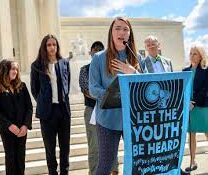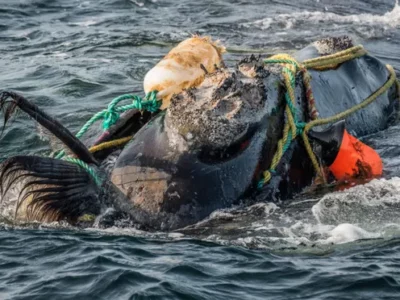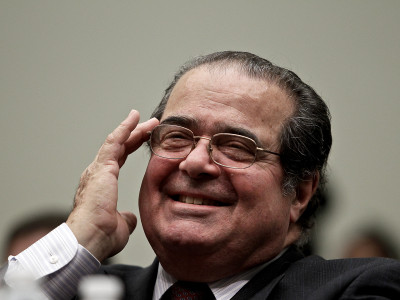constitutional law
America’s Leading Environmental Court
Hint: It’s in the southernmost state. Which is not Florida.
The state court on the cutting edge of environmental law is a long way from the major population and media centers, which may be one reason it doesn’t get much attention. It deserves more. The Hawaiian Supreme Court has been forging new paths in environmental law that may lead the way for other courts in …
Continue reading “America’s Leading Environmental Court”
CONTINUE READINGThe Children’s Crusade
The latest climate lawsuit is well intended, but it’s almost certain to lose and could do serious harm.
The Children’s Trust has filed another lawsuit, one that gives me serious qualms. I know their hearts are in the right place, but I wish they had thought twice about filing this case. I struggle to find any benefit from the litigation. It has no apparent chance of success. Worse, it disparages people in the …
Continue reading “The Children’s Crusade”
CONTINUE READINGA Climate Trial in Montana Sets the Scene for More
Held v. Montana is the first of many climate lawsuits by youth plaintiffs to go to trial. Big Sky Country is a fitting forum for this phase of climate change litigation.
Young people who have the most to lose from climate change have filed lawsuits in all 50 states, but the first of these cases to go to trial will be in Montana—unofficially nicknamed “the Last Best Place”—which may be the perfect venue for a landmark trial about government culpability for the global climate crisis. Starting …
Continue reading “A Climate Trial in Montana Sets the Scene for More”
CONTINUE READINGTaming the Dormant Commerce Clause
A new Supreme Court opinion is good news for state climate regulators.
Although the Constitution does not say so directly, the Supreme Court has said there are implied limits on state regulations that interfere with interstate commerce.. This is known as the dormant commerce clause doctrine. State clean energy laws have been bedeviled by challenges based on this doctrine. The Supreme Court has just made it easier …
Continue reading “Taming the Dormant Commerce Clause”
CONTINUE READINGLobster Wars
An industry lawsuit against Monterey Aquarium is a blatant assault on free speech.
The Maine lobster industry is suing the Monterey Aquarium for advising consumers to avoid Maine lobsters. This is “cancel culture” on steroids. The Aquarium has taken a stand the industry doesn’t like, so the industry is trying to silence it and its other critics. “Silencing” here is quite literal: the industry is seeking an injunction …
Continue reading “Lobster Wars”
CONTINUE READINGBadly Drafted and Constitutionally Suspect
New laws blacklist “discrimination” against fossil fuel companies in states that normally could care less about discrimination of any kind.
Texas and a number of other states have passed laws banning what they call “boycotts of fossil fuel companies.” More precisely, they ban state investment or contracting with firms that “boycott” fossil fuel companies. Besides being fundamentally misguided and difficult to implement, these blacklist laws are poorly drafted and quite likely unconstitutional. The “fundamentally misguided” …
Continue reading “Badly Drafted and Constitutionally Suspect”
CONTINUE READINGThe Nondelegation Doctrine and Its Threat to Environmental Law
Here’s what the doctrine means and why it has suddenly become so significant.
If you ask Supreme Court experts what keeps them up at night, the answer is likely to be the non-delegation doctrine. If you are among the 99.9% of Americans who’ve never heard of it, here’s an explainer of the doctrine and what the 6-3 Court might do with it. What’s the nondelegation doctrine? Simply put, …
Continue reading “The Nondelegation Doctrine and Its Threat to Environmental Law”
CONTINUE READINGThe Kavanaugh Court and the Environment
A new appointment would make Justice Kavanaugh the swing voter. Here’s what that would mean for environmental law.
A new appointment by Trump would shift the Supreme Court well to the right, making Brett Kavanaugh the swing voter in many cases. Kavanaugh has clear views about the powers of agencies like EPA. With him as the swing voter, the main strategy used by Obama to make environmental progress would be off limits for …
Continue reading “The Kavanaugh Court and the Environment”
CONTINUE READINGConstitutional Rights in a Pandemic
When does public health override individual rights?
Lockdowns and social distancing impinge on activities that are protected by the Constitution. That’s been true in many states of church services and in some states of abortion. When the cases have come before they courts, they have often turned to a 1905 Supreme Court case decision, Jacobson v. Massachusetts, which upheld a state law …
Continue reading “Constitutional Rights in a Pandemic”
CONTINUE READINGOn This Date in History: Property Rights Won Big in the Supreme Court
June 29, 1992 was a great day for property rights advocates. But what came later wasn’t so good.
On this date in 1992, the property rights movement achieved its greatest victory in the form of the Supreme Court’s Lucas ruling. The campaign to protect property rights seemed to have huge momentum. But things didn’t work out that way. For property rights advocates, Lucas turned out to be a false dawn. Mr. Lucas owned …
Continue reading “On This Date in History: Property Rights Won Big in the Supreme Court”
CONTINUE READING













